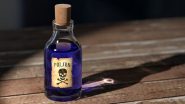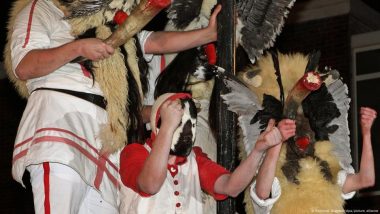The North Sea island of Borkum is reacting to a recent report looking into how a 200-year-old tradition has enabled young men to hit women on the buttocks with a cow's horn.Most people in Germany associate the feast of Saint Nicholas with a harmless tradition: Children leave their cleaned shoes next to the front door on the night of December 5, and the next morning, they expect to find their boots filled with small presents and treats brought by Nikolaus.
Also Read | Latest News | Analysts Cut FY25 Growth Estimates; Expect RBI Rate Reduction Only in Feb Review.
There are, however, regions in Germany, such as in Bavaria, where the Father Christmas-like character has a dark sidekick, the Krampus. The hairy devil has different names according to region, and is part of folkloric festivities involving terrifying costumes and processions.
Also Read | India News | Our Chief Secy in Touch with Bengal Govt over Potato Issue: J’khand CM.
Similarly, the "Klaasohm" festival is a Saint Nicholas tradition celebrated every year on the night of December 5 on the North Sea island of Borkum, which has a population of more than 5,000.
The festival has come into the spotlight in Germany following a video report by public broadcaster NDR.
In the story, two male reporters attempt to film the 2023 festivities.
Using their cell phones, they easily film the daytime celebrations, when the community gathers around young, unmarried men dressed in the traditional costumes of the Klaasohms, made of masks with sheepskin and bird feathers.
Later on, the Klaasohms of different ages challenge each other to a type of wrestling match. This event is reserved for islanders, so tourists or reporters are not allowed to watch it.
The party continues into the night. The reporters secretly film a group of so-called "catchers" as they chase women, hold them while the Klaasohms hit them on the buttocks with a cow's horn. People around them, including children, cheer as one woman is being hit.
Witnesses and victims testify anonymously, fearing consequences
The NDR report includes anonymous interviews with three women and a former male inhabitant of the island who have participated in the ritual and now condemn it.
The women explain that, as children, they were brought up to believe that it was an exciting game of hide-and-seek that was part of the islanders' shared identity, which is why they willingly took part in the ritual as teenagers — but it ended up being a very painful experience.
Even the young man who has left Borkum still feels he cannot show his face on camera, fearing any criticism of the ritual could lead to negative consequences for his family: "On Borkum, if you talk openly about wanting this to stop, you're told that you don't understand the festival, that you're not honoring the tradition and that you're somehow bowing to pressure from outside [the island]," he says.
The NDR reporters asked islanders to comment on the ritual. Many of those who first agreed to talk later insisted their comments be removed from the report before it was broadcast.
'It's important to the men'
Speaking freely on camera, an older woman recalls being beaten in her youth during the festival. She says she has definitely never been a fan of the ritual.
When asked why it is so important to people in Borkum, she replies, "It's important to the men."
"The Borkumers grow up that way and that's the way it is. It's purely a men's day. So you need to ask the men, see what they have to say about it," she adds.
One man laughs it off as harmless fun, explaining that "when they [the young men] see a woman, they beat her up a bit with a cow's horn," adding that "it's not really violent."
But the anonymous interviewees say that being hit left them bruised and in pain for several days. The anonymous former islander points out that men would actually feel proud if a woman could not sit for five or six days after being hit.
The organizers of the festival, as well as the police and the mayor of Borkum, all refused to be interviewed by NDR reporters. The report also points out that all social media coverage of the event is discouraged to avoid uncovering the identity of the Klaasohms.
Authorities react to ban violence
Facing outraged reactions triggered by the report, Borkum authorities acknowledged in a statement that it was a mistake to have avoided the media: "We realize that the report, which paints a distorted picture of the festival and contains numerous journalistic inaccuracies, is the result of us rejecting all of their requests," said the chair of the association Borkumer Jungens e.V. 1830, which is responsible for carrying out the Klaasohm tradition.
The association admits that the tradition can be seen as controversial today. Beating with cow horns was part of the tradition in the past "and in individual cases in recent years," they said in their press statement. "We expressly distance ourselves from any form of violence against women and apologize for the historically-based actions of past years."
"We as a community have clearly decided to leave this aspect of the tradition behind us," the association added. Instead, they want to "continue to focus on what really makes the festival: the solidarity of the islanders."
Similarly, the police are adopting "a zero-tolerance policy," stated a police spokesperson. "Violence will not be accepted."
On Sunday, some 150 to 200 women from Borkum demonstrated for the preservation of the controversial Saint Nicholas ritual.
The NDR journalists point out in their report that it is possible to deal more openly with media criticism, showing the example of the Krampus run in Austria.
According to tradition, people dressed as the devilish figure whip the procession's spectators using a birch rod.
The runs, fueled by alcohol and anarchic collective energy, have made headlines in the past years for violent outbreaks and injured participants.
Now there is tightened security around the Austrian events, with safe spaces for those who don't want to be hit, and numbers assigned to each Krampus so they can be identified if needed. The Krampuses are now encouraged to only symbolically brush festival-goers, and not actually whip them.
Edited by Tanya Ott
(The above story first appeared on LatestLY on Dec 02, 2024 09:10 PM IST. For more news and updates on politics, world, sports, entertainment and lifestyle, log on to our website latestly.com).













 Quickly
Quickly





















